“May my heart always be open to little birds who are the secrets of living.”*
~E.E. Cummings
Every so often a picture book comes across my desk that makes me weep. It’s not always because the story is sad. Roger Ebert said it’s not sadness in movies that make him cry, it’s kindness. Yes. Sometimes, it’s sheer gratitude that such a beautiful thing exists, or the quiet way an author or illustrator expresses the wonder of being alive. Little Bird by Germano Zullo and Albertine is such a book. It’s joy, kindness, wonder, sadness (but of the wistful sort), and beauty. In short, Little Bird is a treasure.
The story of Little Bird is minimalist, as are the illustrations. Although the artist is Swiss, the block of gold against a cloudless blue sky is like a flat, prairie landscape from western Canada. Perhaps it is canola, or wheat, but the details are few, and the only human activity is a red van, ambling down a narrow, winding road. When it stops at the edge of a crevasse, a peculiar-looking fellow in a plaid shirt and blue overalls departs the cab, walks around to the back, and opens the door.
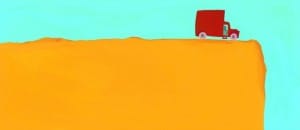 A large bird flies out, followed by a flock of beautifully imagined fowl of varying design and colour. This is no ordinary delivery, and it will be no ordinary day. A small black bird, who for some reason has not followed the others into the sky, stares up at the man from the darkness of the van. The man flaps his arms, encouraging the tiny creature to take wing, but the bird doesn’t move. The man sits down next to the bird, offering part of his sandwich. The two of them eat their lunch in amiable silence, until the man makes an even more ridiculous attempt to lure the bird out of the truck. It works, and the black bird joins the flock. Mission accomplished, or so you might think, but as the text promises, some days are different. Little Bird soars in unexpected ways, and the final illustration is magical, but also funny, and deeply moving.
A large bird flies out, followed by a flock of beautifully imagined fowl of varying design and colour. This is no ordinary delivery, and it will be no ordinary day. A small black bird, who for some reason has not followed the others into the sky, stares up at the man from the darkness of the van. The man flaps his arms, encouraging the tiny creature to take wing, but the bird doesn’t move. The man sits down next to the bird, offering part of his sandwich. The two of them eat their lunch in amiable silence, until the man makes an even more ridiculous attempt to lure the bird out of the truck. It works, and the black bird joins the flock. Mission accomplished, or so you might think, but as the text promises, some days are different. Little Bird soars in unexpected ways, and the final illustration is magical, but also funny, and deeply moving.
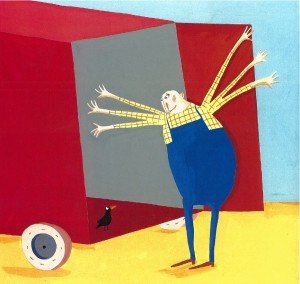 No part of the text refers to birds, or trucks, or men in plaid shirts. Conversely, the illustrations suggest the text, but are not literal translations. In that sense, one could exist without the other, but in unison, Little Bird is an extraordinary meditation on happiness, in the tiniest of packages. In the western world, we are, on a daily basis, deluged by products and schemes hell-bent on making us ‘better’ versions of ourselves, when in fact sensory overload may be the very thing contributing to our inability to affect change in our lives, and in the world. As Little Bird suggests, it is these small things that make us take flight and soar, if we are still enough to be mindful.
No part of the text refers to birds, or trucks, or men in plaid shirts. Conversely, the illustrations suggest the text, but are not literal translations. In that sense, one could exist without the other, but in unison, Little Bird is an extraordinary meditation on happiness, in the tiniest of packages. In the western world, we are, on a daily basis, deluged by products and schemes hell-bent on making us ‘better’ versions of ourselves, when in fact sensory overload may be the very thing contributing to our inability to affect change in our lives, and in the world. As Little Bird suggests, it is these small things that make us take flight and soar, if we are still enough to be mindful.
Albertine’s illustrations are the perfect counter-balance to the spare, contemplative text by Germano Zullo. There is a great deal of humour in the depictions of the man and the bird, in particular his awkward attempts to get the little bird aloft. While the blocks of colour and wide open use of space are striking, the illustrations are tempered with a lovely sort of goofiness, like you might find in the work of Delphine Durand or William Steig. Even the tires of the truck look like donuts, with sprinkles…or perhaps I’m just hungry. However you read it, Little Bird is a book of contrasting elements, simply and beautifully executed, but also whimsically complex, if you choose to see it that way.
“Little things are not made to be noticed. They are made to be discovered.” Just like Little Bird, my favourite book of 2012 (so far.)
Germano Zullo is a prolific writer and poet who lives in Geneva, Switzerland. He writes for adults and children alike, and has written many popular children’s comics and stories.
Albertine also hails from Geneva, Switzerland. She illustrates for many of the daily French newspapers and teaches at the School of Visual Arts in Geneva.
Little Bird by Germano Zullo, illustrated by Albertine. Published by Enchanted Lion Books, 2012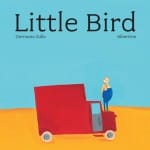
Here’s a short, but delightful video of a scene from Little Bird by Korean designer Young-jun Kim
*from the dedication page

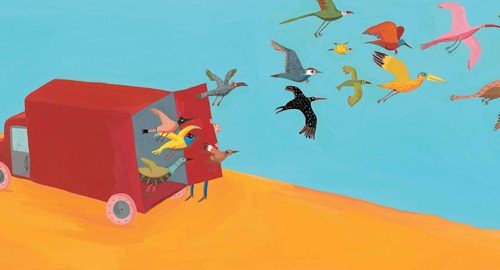
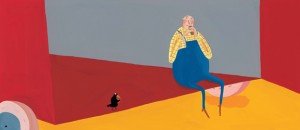

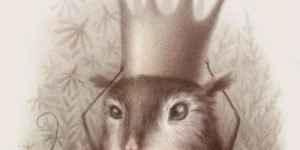
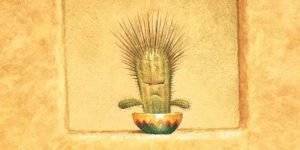
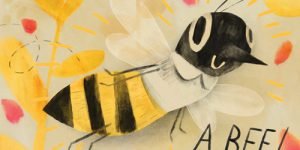
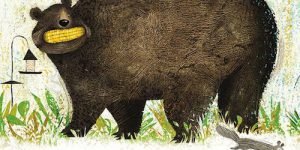
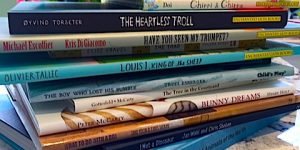

Wow, that sounds like my kind of book!
Yes, I think it’s everyone’s kind of book. It’s so cheerful!
I adore this book. Bought it back in June after crying over it in the bookstore. I had the pleasure of sharing it with a group of 60 primary children. What an experience! They were fascinated. It was a magical read aloud. We had wonderful talks about small acts of kindness that grow!
Oh, I know. It’s so simple, and so beautiful. It will be under several Christmas trees this year, for sure.
[…] 32 Pages […]